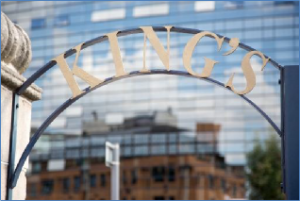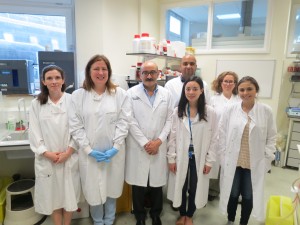Creating a state-of-the-art laboratory for excellence in paediatric research
Opening in 2016 and housed alongside the Variety Children’s Hospital, the Alex Mowat Paediatric Research Laboratories, to be known as the MOWATLABS, will bring together experts in the field of child health, providing the necessary platform to coordinate and advance research into childhood diseases. The aim of the new facility is to maximise the rich source of condition-led information and patient material coming from the hospital and in turn, develop new diagnostic tests and treatments to help children at King’s, and across the world.
Named in memory of our husband and father, Alex Mowat, this facility will be the first dedicated research laboratories fo r paediatric research at King’s College Hospital. This project supports the vision Alex had when he originally founded the paediatric liver unit at King’s. We know he would be delighted with the idea of a new, state-of-the-art space that allows medical professionals from many disciplines to work together and share their ideas for
r paediatric research at King’s College Hospital. This project supports the vision Alex had when he originally founded the paediatric liver unit at King’s. We know he would be delighted with the idea of a new, state-of-the-art space that allows medical professionals from many disciplines to work together and share their ideas for
the benefit of the sick children that they treat.
Variety Children’s Hospital at King’s
King’s College Hospital is home to one of the UK’s leading centres for children: the Variety Children’s Hospital. With a global reputation for delivering outstanding care, King’s provides world-class treatment for children’s liver disease, neurology and neurosurgery, respiratory disease including the management of cystic fibrosis, and oncology and haematology.
In 2009, King’s College Hospital NHS Foundation Trust became part of King’s Health Partners, one of only six Academic Health Sciences Centres in England designated by the Department of Health. As part of the King’s Health Partners, King’s aims to bring about faster and more  effective improvements in health, ultimately impacting the health and well-being of children.
effective improvements in health, ultimately impacting the health and well-being of children.
King’s researchers and clinicians work together to combine the best of basic and translational research, to improve patient care, develop better treatments and increase our understanding of disease. As one of London’s largest teaching hospitals, research findings are disseminated and shared with health professionals around the world.
Research undertaken at King’s has a positive impact on the health of children not just in London and the UK, but across the globe.
Why MowatLabs?
A dedicated, on-site laboratory facility at King’s will allow researchers from multiple disciplines to work together.
Despite leading the international field in paediatric liver research, the team at King’s battles with cramped and outdated laboratories, which are scattered across the Institute of Liver Studies and King’s College Hospital campus.
Not only does this disrupt researchers’ work, wasting precious time traveling around the hospital campus, but it also interferes with other research teams who have to share their facilities and equipment. What little space there is for paediatric researchers within the Institute is desperately over-crowded, hindering the team’s opportunity to expand, and there is no room to accommodate visiting professors and the next generation of PhD students.
The First Dedicated Paediatric Research Facility at King’s
To address the need for research space, we plan to build and equip a state-of-the-art laboratory to be housed within the current Institute of Liver Studies.
Continuing the work that he started, the Alex Mowat Paediatric Research Laboratories, will bring together a critical mass of clinicians, researchers, nurses, intensivists, surgeons, transplant specialists, in a collaborative  research environment, strengthening the quality and output of research predominately for children’s liver disease, but also for research into children’s respiratory medicine, gastroenterology, and sickle cell disease.
research environment, strengthening the quality and output of research predominately for children’s liver disease, but also for research into children’s respiratory medicine, gastroenterology, and sickle cell disease.
The new laboratories will provide the best possible working environment to coordinate and advance research into childhood diseases. The proximity of the laboratories to the wards and clinics within the hospital will help maximise the rich source of condition-led information and patient material coming from the hospital. With a focus on high quality translational research, the studies undertaken in the new laboratories will help develop new diagnostic tests and treatments to help children at King’s and across the world.
King’s Health Partners aims to accelerate ‘bench to bedside’ research; speeding up the time it takes to get innovations in the laboratory out into the local community and providing real benefits for patients.

